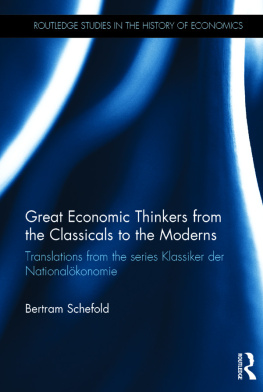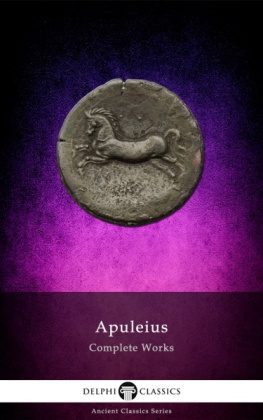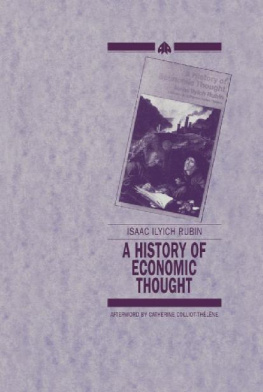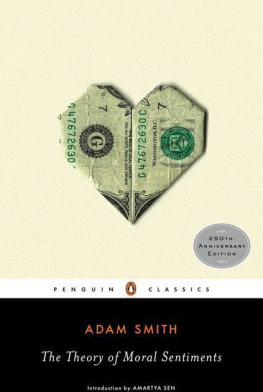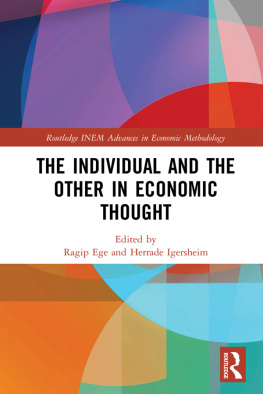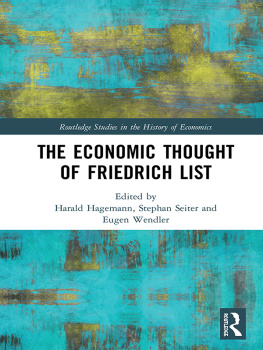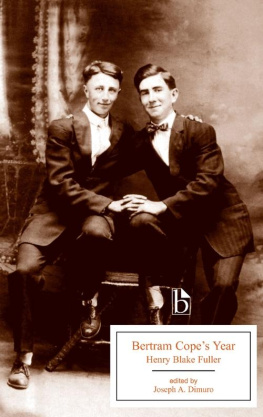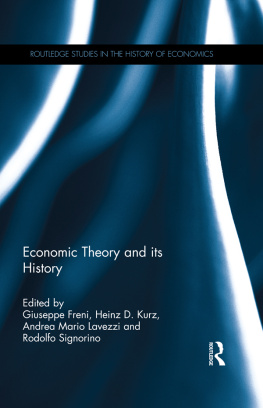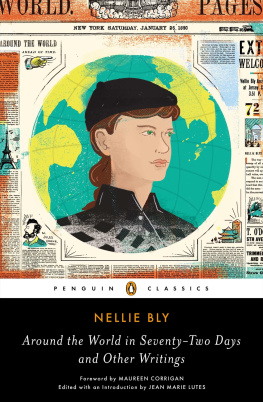
p.i
Great Economic Thinkers from the Classicals to the Moderns
This is the opus magnum of one of the worlds most renowned experts on the history of economic thought, Bertram Schefold. It contains commentaries from the series Klassiker der Nationalkonomie (Classics of Economics), which have been translated into English for the first time. Schefolds choices of authors for this series, which he has edited since 1991, and his comments on the various re-edited works, are proof of his highly original and thought-provoking interpretation of the history of economic thought.
Together with a companion volume, Great Economic Thinkers from Antiquity to the Historical School: Translations from the Series Klassiker der Nationalkonomie, this book is a collection of English translations with introductions by Bertram Schefold. The emphasis of this volume is on the theoretical debates, from the theory of value to imperfect completion; from money to the institutional framework of society; and from the history of economic thought to pioneering works in mathematical economics. This volume is an important contribution to the history of economic thought, not only because it delivers original and fresh insights about well-known figures, such as Marx, Stackelberg, Sraffa, Samuelson, Tooke, Hilferding, Schmoller, and Chayanov, but also because it deals with ideas and authors who have been forgotten or neglected in previous literature.
This volume is of great interest to those who study the history of economic thought, economic theory and philosophy, as well as those who enjoyed the authors previous volume, Great Economic Thinkers from Antiquity to the Historical School .
Bertram Schefold is Senior Professor at the Department of Economics, Goethe-Universitt, Germany. He has published more than 40 books and 250 articles on economic theory, history of economic thought, energy policy and general economic policy. He edited the series Klassiker der Nationalkonomie .
p.ii
Routledge Studies in the History of Economics
For a full list of titles in this series, please visit www.routledge.com/series/SE0341
181 Comparisons in Economic Thought
Economic interdependency reconsidered
Stavros A. Drakopoulos
182 Four Central Theories of the Market Economy
Conceptions, evolution, and applications
Farhad Rassekh
183 Ricardo and the History of Japanese Economic Thought
A selection of Ricardo studies in Japan during the interwar period
Edited by Susumu Takenaga
184 The Theory of the Firm
An overview of the economic mainstream
Paul Walker
185 On Abstract and Historical Hypotheses and on Value-Judgments in Economic Sciences
Critical Edition, with an Introduction and an Afterword by Paolo Silvestri Luigi Einaudi
Edited by Paolo Silvestri
186 The Origins of Neoliberalism
Insights from economics and philosophy
Giandomenica Becchio and Giovanni Leghissa
187 The Political Economy of Latin American Independence
Edited by Alexandre Mendes Cunha and Carlos Eduardo Suprinyak
188 Jean-Baptiste Say and Political Economy
Text by Jean-Baptiste Say
Translated and edited by Gilles Jacoud
189 Economists and War
A heterodox perspective
Edited by Fabrizio Bientinesi and Rosario Patalano
190 Great Economic Thinkers from the Classicals to the Moderns
Translations from the series Klassiker der Nationalkonomie
Bertram Schefold
p.iii
Great Economic
Thinkers from the
Classicals to the
Moderns
Translations from the Series Klassiker
der Nationalkonomie
Bertram Schefold

p.iv
First published 2017
by Routledge
2 Park Square, Milton Park, Abingdon, Oxon OX14 4RN
and by Routledge
711 Third Avenue, New York, NY 10017
Routledge is an imprint of the Taylor & Francis Group, an informa business
2017 Bertram Schefold
The right of Bertram Schefold to be identified as author of this work has been asserted by him in accordance with sections 77 and 78 of the Copyright, Designs and Patents Act 1988.
All rights reserved. No part of this book may be reprinted or reproduced or utilised in any form or by any electronic, mechanical, or other means, now known or hereafter invented, including photocopying and recording, or in any information storage or retrieval system, without permission in writing from the publishers.
Trademark notice : Product or corporate names may be trademarks or registered trademarks, and are used only for identification and explanation without intent to infringe.
British Library Cataloguing in Publication Data
A catalogue record for this book is available from the British Library
Library of Congress Cataloging in Publication Data
A catalog record for this book has been requested
ISBN: 978-1-138-11923-9 (hbk)
ISBN: 978-1-315-65240-5 (ebk)
Typeset in Minion Pro
by Swales & Willis Ltd, Exeter, Devon, UK
p.vii
p.ix
This book is a companion volume to my Great Economic Thinkers from Antiquity to the Historical School . Both document a large research project in the history of economic thought. They contain a planned, coherent, and amended selection of my introductions to the commentary volumes of the Klassiker der Nationalkonomie , translated into English. While the former book assembled the essays on authors of antiquity, the Middle Ages and Scholasticism, Mercantilism, the Historical School, and Asian and Arabian Classics, the present combines the essays on the Classical School, Monetary Theory, the Neoclassicals, the Institutionalists, and their descendants who are here, for lack of a better unifying term, grouped as the Moderns. The former book combined essays that dealt with the formation of economic thought, with the relationship between economic ideas and general history, hence with a relativist and political tradition of economic thought. The present book is more narrowly oriented on the positivist history of economic theory, hence on the analytical reconstruction of the theories of schools and individuals.
We take up part of the explanation provided in the Preface of the previous book, with some omissions and complements: The Klassiker -series was composed of 100 facsimile editions of Classical texts of economics, the facsimile being that of the first edition (in some cases, for texts older than the invention of printing, the facsimile was that of a manuscript). Each text was accompanied by a volume of commentaries, to which I usually had written an introduction. The focus is on the continental tradition, in a German perspective, but with a wide temporal and spatial horizon, going from antiquity to the twentieth century, and including not only European, but also Arab and East Asian authors; they were chosen according to criteria which were explained in the Introduction to the previous book, together with the history of the edition of the Klassiker .
p.x
The initiative to have the essays translated came from the late Mark Perlman, who thought that these texts might provide an insight into currents which are alternatives to the Anglo-Saxon tradition. A selection had first been made by Volker Caspari; it was edited as Beitrge zur konomischen Dogmengeschichte. Ausgewhlt und herausgegeben von Volker Caspari (Schefold 2004a). Here, for the second book, additional translations not contained in Casparis selection and two essays on Marx first published in German outside the Klassiker -series have been included. Thus, the reader can form an opinion on the programme of the Klassiker -series as a whole (the complete list of the series is found in the Appendix). The series, to the extent that it resulted from my choices, but especially the present selection of introductions, reflects my special interest in the modern revival of classical economic thought, which offers a rigorous theory of value but is open with respect to historically changing influences on distribution, demand, and employment. Where others have only mentioned the importance of social, political, and historical factors on economic development, I have increasingly sought to integrate the economic with historical and cultural approaches and demonstrated that the same endeavour can be observed in the normative economics of antiquity and the Middle Ages, in the intensely political texts of Mercantilism and Cameralism, and that the Historical Schools (in the widest sense, including Marx) continued this tradition as an interdisciplinary approach, combining economic, sociological, historical, and legal considerations, even psychology and cultural studies. Great Economic Thinkers from Antiquity to the Historical School was largely concerned with the emergence of economics as a specific dimension of social life. German ordoliberalism, represented here by Rpke and Mller Armack, is an heir to this tradition, despite its rejection of historicism and its reliance on Neoclassical modelling, especially in the case of Eucken. Neoclassical theory offers more partial insights, founded on more restrictive assumptions and models. Here we show how differentiated Neoclassical Theory could be and yet united by a common vision of how commodity and factor markets should be analysed by reducing supply and demand to preferences, endowments, and technology. The Classical School, with which we begin, differed primarily with regard to the theory of distribution and employment but used, in essence, the same theory of normal prices. We present an attempt to explain the relationship between these schools schematically in the following Introduction.
Next page
